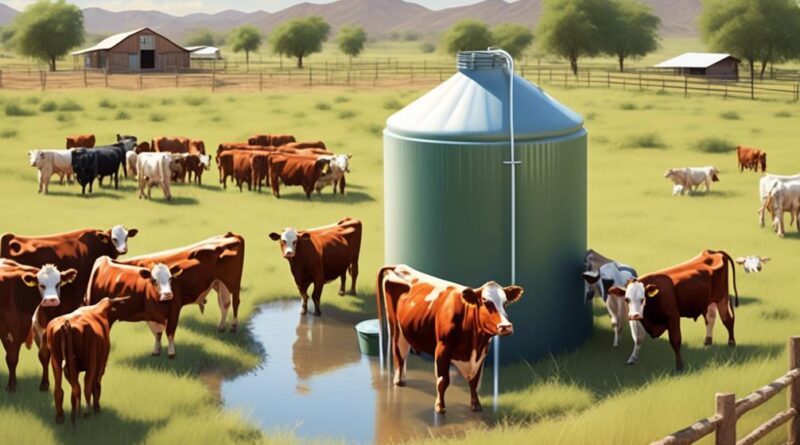Why Is Minimizing Water Usage Important in Sustainable Cattle Operations?
In the vast landscape of sustainable cattle operations, water is the lifeblood that nourishes the vitality of your endeavors. As a cattle rancher, you understand the intricate dance between conservation and productivity. You've likely pondered how to navigate the delicate balance between meeting the water needs of your herd and ensuring the sustainability of your operation.
But have you considered the far-reaching implications of minimizing water usage? It's not just about ensuring a stable water supply for your cattle; it's about laying the groundwork for a sustainable future for both your business and the environment.
Water Scarcity and Cattle Farming
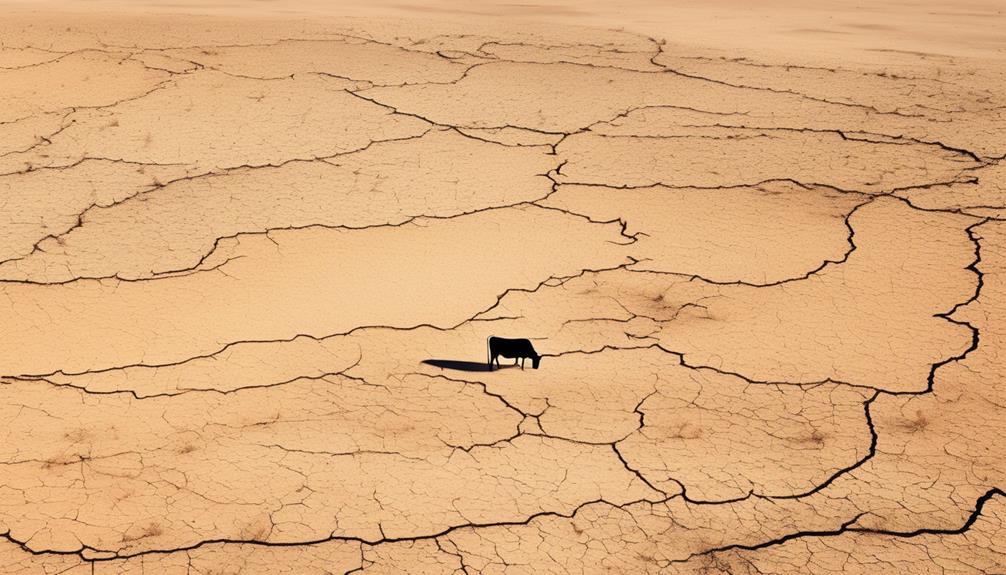
To address water scarcity in cattle farming, prioritize efficient irrigation and water management practices. Water conservation is crucial in the face of increasing droughts and competing demands for water. Implementing efficient irrigation systems, such as drip or pivot irrigation, can significantly reduce water usage while ensuring that the cattle receive adequate hydration. Additionally, adopting drought management strategies, like pasture rotation and drought-resistant forage, can mitigate the impact of water scarcity on cattle farming.
When it comes to water conservation, it's essential to monitor and maintain irrigation equipment to prevent leaks and minimize water wastage. Regularly inspecting pipes, valves, and nozzles can help identify and address any issues promptly. Furthermore, utilizing moisture sensors and weather data can inform precise irrigation scheduling, optimizing water usage based on actual crop and soil needs.
In terms of drought management, diversifying forage options with drought-resistant plants can help sustain cattle through dry periods. Additionally, implementing rotational grazing can prevent overgrazing and promote healthier pastures, which are better equipped to withstand drought conditions.
These strategies not only contribute to water conservation but also enhance the resilience of cattle farming operations against the challenges posed by water scarcity and drought.
Efficient Water Management Techniques
Efficient water management techniques play a crucial role in addressing water scarcity in cattle farming, ensuring optimal hydration for the cattle while minimizing water usage. By implementing the following techniques, you can significantly improve water efficiency on your cattle farm:
- Rainwater Harvesting: Installing rainwater harvesting systems allows you to collect and store rainwater for later use, reducing reliance on traditional water sources. This technique not only conserves water but also provides a sustainable alternative for cattle hydration.
- Drip Irrigation: Utilizing drip irrigation systems delivers water directly to the roots of plants, minimizing evaporation and ensuring efficient water usage. This technique can be particularly beneficial for irrigating pastures or crops grown for cattle feed, optimizing water distribution.
- Water Recycling: Implementing water recycling systems enables you to treat and reuse wastewater for non-potable purposes, such as cleaning and irrigation. This approach reduces the overall water demand while promoting sustainability within your cattle operation.
- Monitoring and Control Systems: Installing monitoring and control systems allows you to track water usage, identify inefficiencies, and optimize water distribution. This proactive approach enables you to make data-driven decisions to minimize water waste.
- Educational Initiatives: Educating farm workers and stakeholders about the importance of water conservation and efficient water management practices fosters a culture of sustainability on the cattle farm. By promoting awareness and understanding, you can ensure collective efforts towards minimizing water usage.
Implementing these efficient water management techniques can lead to significant water savings, reduced environmental impact, and improved sustainability in your cattle operation.
Impact of Water Usage on Cattle Health
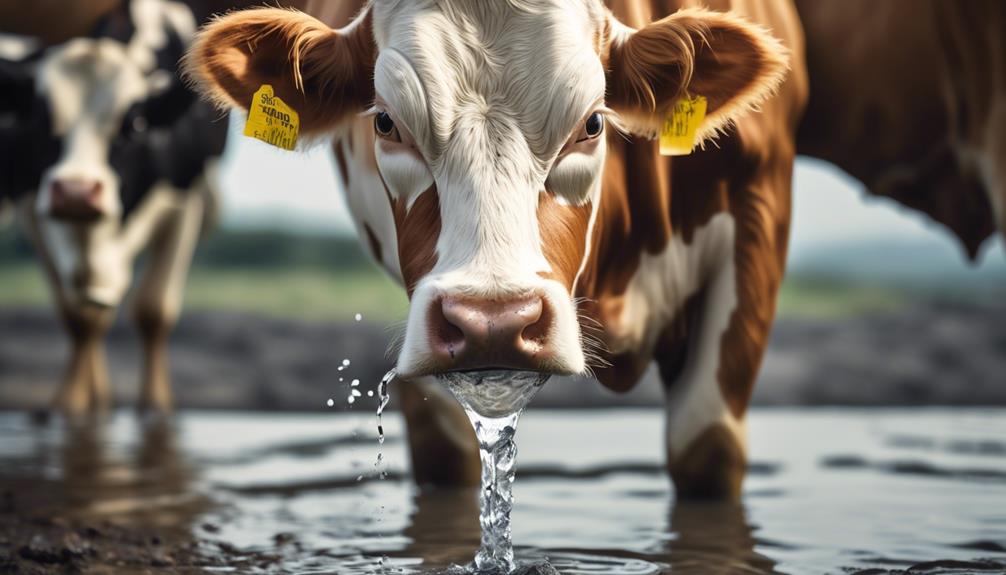
Maximizing water usage while ensuring proper hydration is essential for maintaining the health and well-being of your cattle. Cattle hydration directly impacts their overall health and productivity. Adequate access to clean and quality water is crucial for proper digestion, nutrient absorption, and body temperature regulation in cattle.
Insufficient water intake can lead to dehydration, which can cause reduced feed intake, weight loss, and decreased milk production in lactating cows. Additionally, poor water quality can result in health issues such as diarrhea, bacterial infections, and reduced fertility in both cows and bulls.
Water quality also plays a significant role in cattle health. Contaminated water sources can introduce harmful pathogens and toxins, leading to various illnesses and decreased immune function in cattle. It's important to regularly test water sources for impurities and maintain clean and accessible watering facilities to ensure that your cattle have continuous access to high-quality water.
Monitoring your cattle's water consumption and providing access to clean and fresh water at all times is essential for preventing dehydration and maintaining their health. In addition to quantity, the quality of water is equally vital for your cattle's overall well-being.
Sustainable Grazing Practices
Ensuring sustainable grazing practices for your cattle is crucial for maintaining their health and productivity, especially considering the significant impact of water usage on their overall well-being. Implementing regenerative grazing and rotational grazing techniques can greatly contribute to sustainable cattle operations. Here's why these practices are essential:
- Regenerative Grazing: By allowing the cattle to graze in a manner that mimics natural grazing patterns, regenerative grazing promotes healthier pastures. This method can improve soil health, enhance biodiversity, and increase carbon sequestration, all of which contribute to sustainable land management.
- Rotational Grazing Techniques: Rotational grazing involves dividing pastures into smaller paddocks and rotating the cattle through these areas. This helps prevent overgrazing, allows for more efficient use of forage, and promotes uniform grazing across the pasture. As a result, rotational grazing can lead to improved forage quality and quantity over time.
- Reduced Soil Erosion: Sustainable grazing practices help prevent soil erosion by maintaining ground cover and promoting healthier root systems. This is crucial for preserving the integrity of the land and ensuring its long-term productivity.
- Improved Water Infiltration: Proper grazing management can enhance water infiltration, allowing rainwater to penetrate the soil more effectively. This helps recharge groundwater resources and reduces the risk of runoff and soil moisture loss.
- Enhanced Nutrient Cycling: Sustainable grazing practices can improve nutrient cycling within the ecosystem, leading to better soil fertility and plant growth. This contributes to the overall health of the grazing land and supports sustainable cattle operations.
Water Conservation Strategies
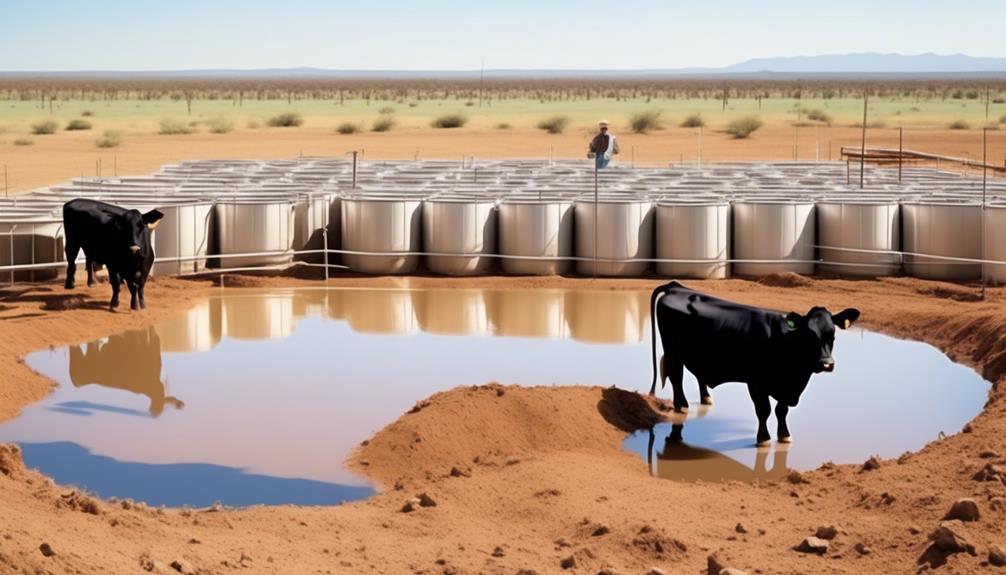
To conserve water effectively in your cattle operations, consider implementing targeted irrigation practices and utilizing efficient watering systems.
Efficient irrigation methods such as drip or trickle irrigation can help minimize water wastage by delivering water directly to the base of plants, reducing evaporation and runoff. These methods ensure that water is used more effectively, especially during dry periods when water conservation is crucial for maintaining pasture productivity.
Additionally, incorporating drought-resistant forage species into your grazing areas can help reduce the overall water requirements for your cattle operations.
In addition to targeted irrigation, utilizing efficient watering systems for your cattle can significantly contribute to water conservation. Implementing automatic waterers with float valves can help prevent water overflow, reducing unnecessary water usage. Moreover, installing troughs with proper drainage systems can minimize water loss due to spillage and evaporation.
Furthermore, adopting rotational grazing practices can also contribute to water conservation. By allowing pastures to rest and recover between grazing periods, you can promote healthier grass growth, which in turn can reduce the need for excessive watering.
Environmental Benefits of Reduced Water Usage
Reducing water usage in your cattle operations not only conserves a vital resource but also provides significant environmental benefits. By minimizing water consumption, you can directly reduce your water footprint and positively impact the ecological balance.
Here are some of the environmental benefits of reduced water usage:
- Conservation of Water Resources: Minimizing water usage in cattle operations helps in preserving water for other essential needs and ecosystems. This prevents the depletion of local water sources and ensures that water remains available for both human and animal consumption.
- Protection of Aquatic Habitats: Reduced water usage results in less runoff and leaching of harmful substances, such as fertilizers and pesticides, into nearby water bodies. This helps in preserving the health and biodiversity of aquatic habitats.
- Mitigation of Soil Erosion: Lower water usage reduces the need for intensive irrigation, which in turn helps in maintaining soil structure and reducing erosion. This protects the quality of soil and prevents sedimentation in waterways.
- Energy Conservation: Decreased water usage also leads to lower energy consumption for water pumping, heating, and treatment. This contributes to a reduction in the overall carbon footprint of cattle operations.
- Enhanced Sustainability: Ultimately, reducing water usage contributes to the overall sustainability of cattle operations by minimizing their environmental impact and promoting the responsible use of natural resources.
Implementing water conservation strategies not only benefits your cattle operations but also plays a crucial role in promoting environmentally sustainable practices.
Technology for Monitoring Water Consumption
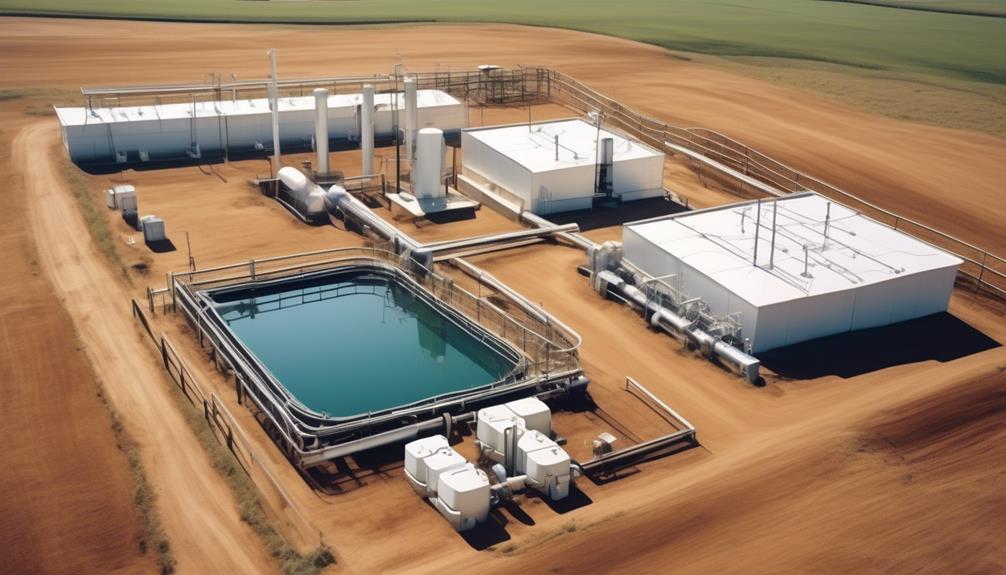
By incorporating advanced monitoring technology, you can effectively track and manage water consumption in your cattle operations. Remote monitoring allows you to keep an eye on water usage in real-time, even when you're not physically present on the farm.
Smart sensors play a crucial role in this process by providing accurate data on water levels and flow rates. These sensors can be installed at various points across your operation, such as water troughs and pipelines, to capture comprehensive information about water usage.
Smart sensors are designed to detect any anomalies or irregularities in water consumption, alerting you to potential leaks or excessive usage. This proactive approach enables you to address issues promptly, preventing wastage and ensuring that your cattle have an adequate supply of water at all times.
Additionally, the data collected by these sensors can be analyzed to identify patterns and trends in water usage, helping you make informed decisions about conservation strategies and resource allocation.
The use of remote monitoring and smart sensors not only enhances your ability to manage water consumption but also contributes to overall sustainability. By minimizing waste and optimizing usage, you can reduce the environmental impact of your cattle operations while promoting efficient resource management.
Embracing technology in water monitoring aligns with the principles of sustainable agriculture and demonstrates your commitment to responsible stewardship of natural resources.
Economic Advantages of Water Efficiency
Embracing technology in water monitoring not only enhances your ability to manage water consumption but also brings about economic advantages through efficient resource allocation and cost savings.
- Cost savings: By efficiently managing water usage, you can significantly reduce your operational costs. Implementing water-efficient practices such as drip irrigation and water recycling systems can lead to long-term savings on water bills and energy expenses.
- Resource allocation: Optimizing water usage allows you to allocate resources more effectively. By understanding your water needs and consumption patterns, you can make informed decisions about where to invest resources, whether it's in expanding your herd or improving other aspects of your operation.
- Improved productivity: Water efficiency can directly impact your cattle's health and productivity. Ensuring that they have access to clean and adequate water supplies can lead to better growth rates and overall well-being, ultimately resulting in improved profitability for your operation.
- Regulatory compliance: Implementing water-efficient practices can help you comply with environmental regulations and standards. This proactive approach not only avoids potential fines but also enhances your reputation as a sustainable and responsible cattle operation.
- Long-term sustainability: Investing in water efficiency measures today ensures the long-term sustainability of your cattle operation. By conserving water resources, you contribute to the preservation of the environment while securing the future viability of your business.
Frequently Asked Questions
What Are the Long-Term Environmental Impacts of Excessive Water Usage in Cattle Operations?
Excessive water use in cattle operations leads to environmental degradation and resource depletion. It causes long-term impacts like soil erosion and water pollution. You should minimize water usage to protect the environment and ensure sustainability.
How Does Water Availability Affect the Nutritional Value of Grazing Land for Cattle?
Water availability directly impacts the nutritional value of grazing land for cattle. Insufficient water can lead to reduced forage quality, impacting cattle health. Managing water usage is crucial for sustaining healthy grazing land and supporting cattle nutrition.
What Role Does Water Quality Play in the Overall Health and Well-Being of Cattle in Sustainable Operations?
To maintain cattle health in sustainable practices, water quality is crucial. It directly impacts grazing land nutrition and overall well-being. Ensure water availability and quality to support the nutritional value of the land and the health of the cattle.
Are There Any Potential Regulatory Changes or Policies That Could Impact Water Usage in Cattle Operations in the Future?
Potential regulatory changes or policies could impact water usage in cattle operations. It's important to focus on water conservation and efficiency to meet potential new requirements. Stay informed and adapt to ensure sustainable practices.
What Are Some Innovative, Cutting-Edge Technologies Being Developed to Further Minimize Water Usage in Sustainable Cattle Operations?
To minimize water usage in sustainable cattle operations, innovative technologies like automated waterers and water recycling systems are being developed. These sustainable practices focus on efficiency improvements to conserve water and promote environmental responsibility.
Conclusion
So, as you can see, minimizing water usage is crucial for sustainable cattle operations.
Efficient water management techniques, sustainable grazing practices, and water conservation strategies all play a vital role in ensuring the health of the cattle, protecting the environment, and saving costs.
By implementing these strategies and using technology for monitoring water consumption, you can contribute to the long-term success and sustainability of your cattle farming operation.
